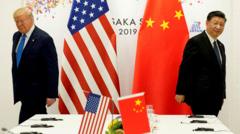The ongoing trade conflict between China and the United States shows no signs of resolution, highlighting the precarious nature of international economic relations.
China and the U.S. Locked in a Tariff Standoff: Implications for Global Trade

China and the U.S. Locked in a Tariff Standoff: Implications for Global Trade
As tensions over tariffs escalate, expert analysis reveals the far-reaching impact on economies worldwide.
In the latest chapter of the U.S.-China trade dispute, President Donald Trump and President Xi Jinping have dug in their heels over escalating tariffs, with significant repercussions for American businesses, particularly in agriculture. The Chinese government recently implemented a steep 34% increase on U.S. goods, compounding existing tariffs of 10-15% on agricultural exports. This cumulative impact is expected to severely limit U.S. producers' access to the Chinese market, prompting concerns within the U.S. agriculture sector.
China seems undeterred by the potential fallout, signaling a pivot toward other international suppliers for commodities like chicken, pork, and sorghum. This dynamic not only challenges U.S. farmers’ market positions but also poses a wider threat to the delicate fabric of global supply chains that have become increasingly interdependent. Analysts warn that these developments could precipitate a ripple effect through the global economy, leading to unsettling disruptions across multiple sectors.
The timing of China's announcement has sparked intrigue, occurring on a Friday evening during a public holiday, suggesting various motivations ranging from limiting domestic panic to a decisive abandonment of negotiating hopes. Observers are skeptical about the possibility of a swift resolution to the trade tensions as Xi demonstrated nonchalance, involving himself in environmental efforts, rather than responding immediately to Trump's tariffs.
This stance projects confidence from Beijing, indicating that the Chinese leadership may pursue alternative trade partnerships, including with nations formerly aligned closely with the U.S. Such strategies could further isolate American companies and inflate prices for U.S. consumers already affected by the current tariffs.
The escalating cycle of tariffs raises critical questions about the future of trade relations between these two economic powerhouses and the broader implications for international commerce.
Key insights from the ongoing trade war between China and the U.S. include:
- The immediate effects on U.S. agricultural producers facing choking tariffs.
- China's potential shift towards strengthening alliances with other economies.
- Analysts' concerns about the unpredictable knock-on effects in global supply chains.
The broader picture reveals an urgent need for dialogue and compromise to avert a deeper economic crisis.





















